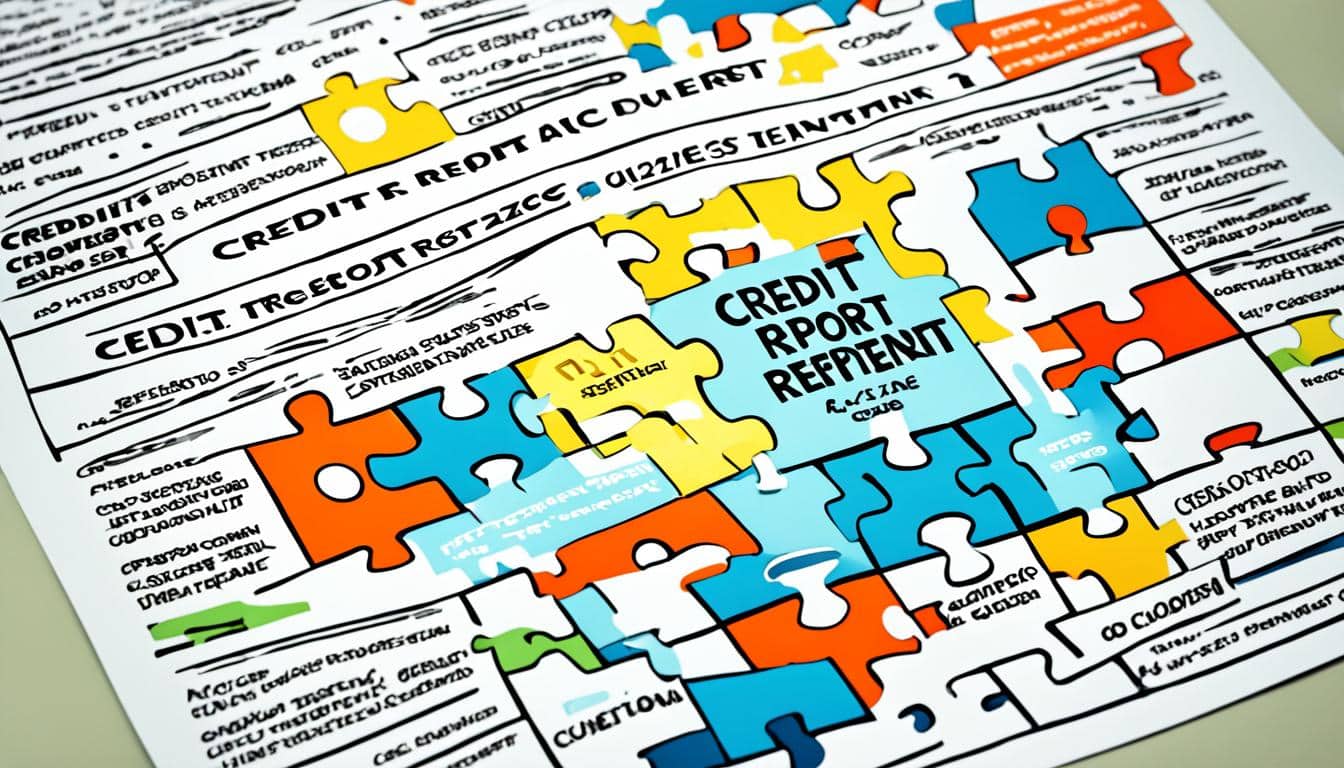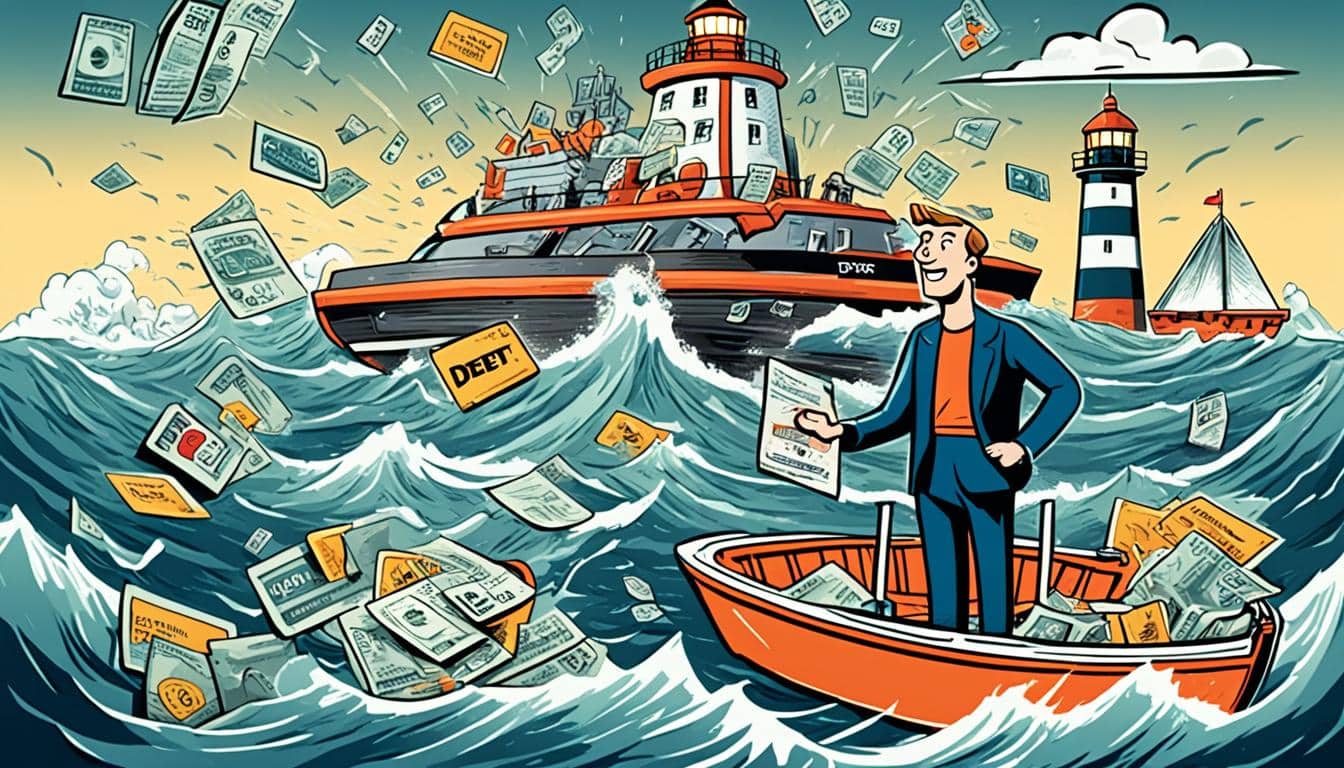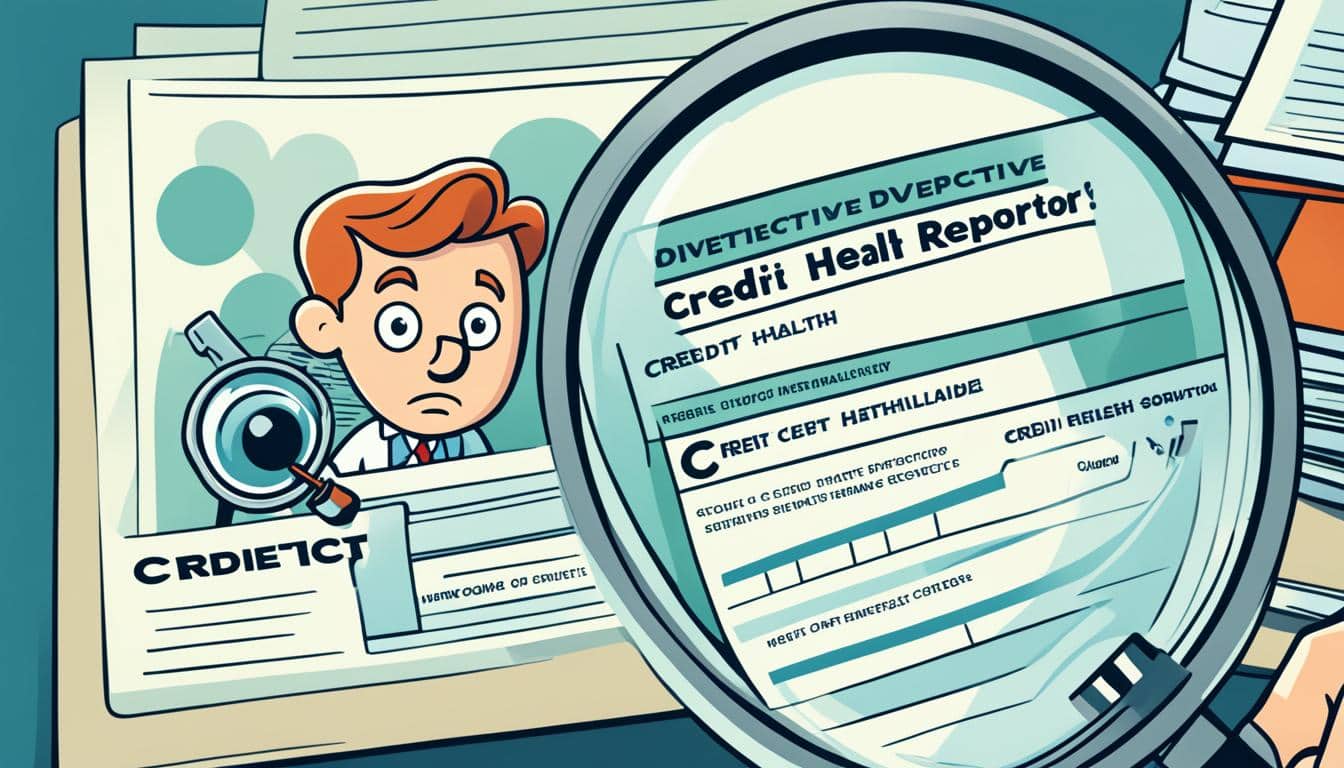Table of Contents (Click To Jump)
Did you know your credit history matters a lot when lenders make financial decisions? Decoding your credit report can seem tough, like figuring out ancient symbols. It has a big effect on your financial health now. I’ve been through it—navigating through complex legal stuff that nearly hurt my credit score.
Checking your credit report regularly is crucial, not just for the overly cautious. Imagine you’re about to get a dream loan, but a mistake in your credit history ruins it. I learned how important it is to understand every detail of your credit report—the good and the bad.
Let’s take this trip together and explore your financial story. By keeping an eye on your credit report and finding mistakes, you can fix big issues. Time to put on your detective hat and really get into your credit report.
Key Takeaways:
- Your credit history significantly influences lenders’ financial decisions.
- Regularly scrutinizing your credit report can help identify and correct inaccuracies.
- You can dispute errors with credit bureaus online, by mail, or over the phone.
- Personal information on the report includes your name, Social Security number, birth date, addresses, and contact information.
- Credit history details cover FICO score components, payment history, accounts, credit limits, statuses, and public records.
- Understanding and managing your credit report can lead to better loan conditions and interest rates.
What is a Credit Report?
Let’s understand what a credit report is. Think of it as a storybook of your financial life. It’s got all your money moves, both big and small. Yes, it feels a bit like snooping, but it’s very important.
Definition and Overview
A credit report is basically a detailed list of your credit history. Imagine it as a school report card, but for your finances instead. It includes credit report basics like your identity, job history, credit accounts, legal issues, and credit checks. These are used by lenders to figure out if you can be trusted with money.
Components of a Credit Report
Your credit report is full of details. It has a lot of credit report info:
- Personal Information: Like your name, address, and Social Security number.
- Employment History: Lists where you’ve worked.
- Credit Accounts: Includes credit cards, loans, and student debts.
- Public Records: Any financial legal issues you’ve had.
- Inquiries: Times when companies checked your credit for applications.
The most crucial part is your payment history, making up 35% of your score. Bad credit info and certain public records can stick around for seven to ten years.
Importance of Credit Reports
Why care about these credit report details? Because they open doors to financial chances. Lenders look at them to set your interest rates and to decide on loan approvals. A good credit score means lower costs on loans.
Knowing your credit report overview helps you use it wisely. It’s best to check it yearly. This way, you can catch and fix mistakes. It could really protect your money’s future.
How to Obtain Your Credit Report
Getting your credit report is actually easy. Think of it as simple as brewing your morning coffee. You can easily pull up this important document through AnnualCreditReport.com. This site is your best friend when it comes to credit information.
AnnualCreditReport.com
AnnualCreditReport.com is your go-to place for free, straightforward credit information. No need to jump through hoops. Just visit this website. It lets you get detailed reports from the big credit bureaus. Each year, you’re allowed one free report from Equifax, Experian, and TransUnion. It’s like getting a financial health check-up at no cost every year.
The Three Major Credit Bureaus
Equifax, Experian, and TransUnion form the cornerstone of credit reporting. They are known as the “Big Three.” While they might report slightly different details, the essential information they provide is the same. They collect data from numerous sources to create your complete credit report. This helps lenders make informed decisions when you apply for credit.
How Often Should You Check?
It’s crucial to regularly check your credit report. Experts suggest doing it several times a year to find and fix any mistakes. While you get one free check annually, you can spread out requests to the three bureaus. This way, you can keep an eye on your credit without spending extra. Think of these checks as routine health screenings for your finances. Following these steps will help you keep your credit in top shape.
Understanding Credit Reports
Reading your credit report might seem like solving a complex mystery. But, mastering this is vital for your financial wellbeing. Your report is split into sections, each detailing different aspects of your financial history.

Breaking Down the Sections of a Credit Report
Credit reports are made up of key parts, each important in its own right. Let’s take a quick credit report breakdown:
- Personal Information: Contains details like your name, address, Social Security number, and date of birth.
- Credit Accounts: Lists your credit cards, loans, outstanding balances, and payment history.
- Public Records: Includes bankruptcies, tax liens, and civil judgments.
- Inquiries: Shows who has checked your credit report.
Spotting Errors and Inaccuracies
Mistakes in your credit report can harm your financial health. Regular credit report reviews let you find these issues. You might see wrong personal info, accounts that aren’t yours, or false late payments.
Correcting Mistakes
If you find errors, there’s no need to panic. Here’s a step-by-step to fix them:
- Identify the Error: Be sure the mistake is clear.
- Contact the Credit Bureau: Tell Equifax, Experian, or TransUnion about the error.
- Provide Documentation: Give evidence to back your claim.
- Follow Up: Make sure the bureau fixes the mistake.
Why Regular Review is Essential
Like a health check-up can find diseases early, checking your credit report keeps your finances healthy. Credit reports update every 30 days. With regular checks, you can monitor new accounts and changes. This keeps your credit report true and up-to-date.
What Affects Your Credit Report?
Your credit report tracks your financial history. It’s detailed, without celeb-style scandals. The major factors? They include payment history, debt amounts, how long you’ve had credit, and the types of credit you use.
Payment History
Payment history is crucial: always pay bills on time. Being punctual with payments shows you’re responsible. Banks and credit companies watch this closely. They report your payment habits to agencies like Equifax, TransUnion, and Experian monthly. A great payment record means better loan and credit card rates.
Amounts Owed
The debt you have affects your credit score. Using too much credit makes lenders wary. They update your credit utilization ratio about every month. This ratio shows if you’re financially stable or close to trouble.
Length of Credit History
Having credit for a long time helps your score. It shows you manage credit well. Creditors report your account longevity to bureaus, showing you’re experienced.
Credit Mix & New Credit
A mix of credit types boosts your report. But, be cautious with new credit. Every new credit check can lower your score. Lenders check your credit before approving loans. Too many inquiries might scare them away.
How to Read Your Credit Report Like a Pro
Understanding your credit report can seem like solving a puzzle. Let’s start by checking your personal info is correct. This helps avoid mistakes that could hurt your credit score.
Personal Information
Your report lists key details like your name, Social Security number, and address. Make sure these are accurate to prevent issues.
Credit History Details
This part of your report is very important. It shows your open and closed accounts, payment history, and more. Knowing these details helps you see how you’re doing financially.
Public Records and Inquiries
Public records show big financial problems like bankruptcies. Credit inquiries are checks into your credit. Understanding these helps you see what affects your score.
Recognizing Red Flags
Spotting issues on your report is crucial. Look for things that seem wrong, like accounts you don’t know. Fixing these quickly helps keep your credit in good shape.
Checking your report often is smart. It helps you spot and fix mistakes fast. Knowing your credit details helps you protect your financial story.
Steps to Improve Your Credit Score
Improving your credit score can feel hard, but it’s doable with the right steps. I’ll share some tips that helped me aim for the perfect score.
Making Timely Payments
One key thing I learned is on-time payments make up 35% of your FICO® Score. It’s a big deal for boosting your score. Always pay on time to see your score climb.
Keeping Low Balances
It’s important to watch how much credit you use versus your limit. Keeping usage under 30% shows smart credit habits. This approach has really helped my score, and it can help yours too.
Building a Diversified Credit Portfolio
Having a mix of credit types can help your score. This includes credit cards, student loans, and more. This diversity shows lenders you’re good with various credit types.
Limiting New Credit Applications
Too many new credit applications can hurt your score. They lead to hard inquiries, which impact your score. Being cautious with new credit can protect your score from dipping.
To sum it up, pay on time, keep balances low, have different credit types, and limit new credit applications. These steps, followed with patience, will boost your credit score. These credit report tips will increase your credit report knowledge and improve your financial wellbeing.
Common Mistakes and How to Avoid Them
Even smart people can mess up with credit. A big mistake is using too much credit. This can hurt your credit score really fast. It’s like eating too many triple cheeseburgers and harming your health. If your credit card balance is over 30% of your limits, you’re in risky territory. One wrong move, and your score could fall. And not paying on time? That mistake will haunt your credit report for seven years.
Overutilizing Credit
Having high credit card balances is bad for your score. It’s like running a marathon with heavy weights. You’re making a statement, but not a good one. It’s key to keep those balances low. You don’t have to be a money expert to fix this. Moving your balance or spending less can help you avoid this mistake.
Ignoring Payments
If you’re always late with payments, you’re asking for trouble. Late payments are like dark clouds over your credit report, staying there for seven years. They can really ruin a good credit score. Paying bills on time keeps your credit looking good. I know from experience, setting reminders and automatic payments make it easier.
Applying for Too Much Credit
Applying for many credit cards quickly is a bad idea. It’s like eating too much junk food—it will show, but in your credit score. Doing this makes lenders think you’re desperate or careless. Space out your credit applications. Apply only when you really need to.
Not Reviewing Your Credit Report
Not checking your credit report is a huge mistake. It’s like ignoring your car’s warning light. Sooner or later, you’ll face problems. With sites like AnnualCreditReport.com offering free reports, there’s no reason to ignore it. Checking your report regularly helps you catch errors and keeps your credit in top shape. Maintaining good credit habits and reviewing your report can protect your financial health.
FAQ
What is a credit report?
Think of a credit report as your financial story. It records your credit history, personal details, credit accounts, public records, and inquiries. Lenders look at it to see if you’re good with money.
How do I obtain my credit report?
It’s easy to get your credit report! Just visit AnnualCreditReport.com. There, you can get a free report once a year from Equifax, Experian, and TransUnion.
Why is it important to check my credit report regularly?
Checking regularly helps you find mistakes or identity theft early. It’s like keeping an eye on your financial health. Experts even recommend checking more often than once a year.
What are the main components of a credit report?
Your credit report has key parts: personal information, work history, credit accounts, public records, and inquiries. Each part helps tell your financial story.
What should I do if I spot an error on my credit report?
If you find a mistake, don’t panic. Contact the credit bureau immediately and dispute the error. Make sure to provide any evidence you have. It’s important that your credit report is accurate.
How often should I check my credit report?
You should definitely use your free annual reports from each bureau. For best practices, check more often, maybe every three months. This can help you catch issues early.
What affects my credit score the most?
Many factors impact your score, like your payment history and how much you owe. How long you’ve had credit, the types of credit you have, and any new credit also play a part. It’s a mix of everything.
How can I improve my credit score?
To boost your score, pay on time, keep your balances low, and have a mix of credit types. Avoid too many new credit applications. Consistency is crucial.
Why is reviewing my credit report regularly essential?
Regular reviews let you spot errors or fraud early. Think of it as a financial health check-up. Staying proactive can save you from big troubles later.
What are common mistakes people make with their credit?
People often use too much credit, miss payments, apply for many credits, and skip credit report checks. These can all hurt your credit score.
How do I decode my credit feedback?
Begin by confirming your personal details are correct. Then, go over each credit account and public record. Don’t forget to check inquiries too. Be on the lookout for errors and act if you find any. You’re the detective of your own financial story!




